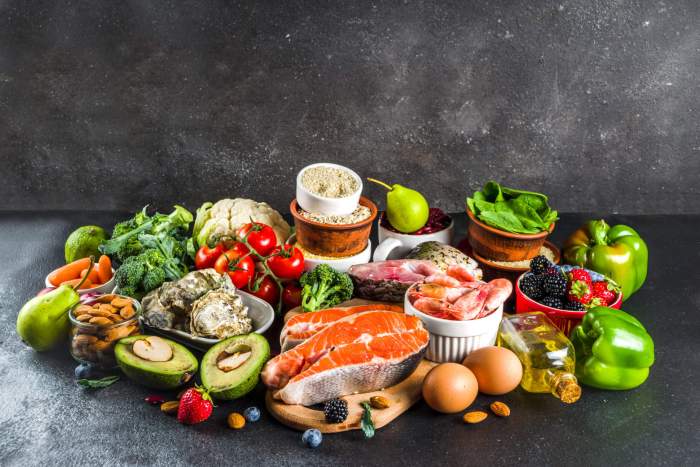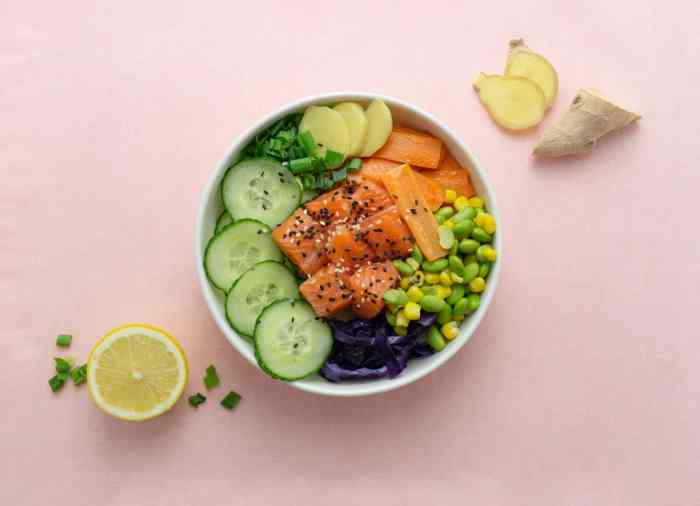Healthy pescetarian meals offer a unique blend of plant-based protein and omega-3 fatty acids, providing numerous health benefits. This comprehensive guide explores the nutritional advantages, meal planning strategies, and delicious recipes that make pescetarianism a fulfilling and sustainable dietary choice.
Nutritional Benefits of Pescetarian Diet
A pescetarian diet, which includes fish and seafood but excludes other types of meat, offers a range of health benefits. Fish and seafood are rich sources of essential nutrients, including omega-3 fatty acids, protein, vitamins, and minerals.
Omega-3 Fatty Acids
- Omega-3 fatty acids are essential fatty acids that the body cannot produce on its own. They play a crucial role in heart health, brain function, and inflammation reduction.
- Fish and seafood are excellent sources of omega-3 fatty acids, particularly EPA (eicosapentaenoic acid) and DHA (docosahexaenoic acid).
- Studies have shown that consuming fish and seafood regularly can reduce the risk of heart disease, stroke, and dementia.
Protein
- Protein is essential for building and repairing tissues, producing enzymes and hormones, and transporting nutrients throughout the body.
- Fish and seafood are high-quality sources of protein, containing all the essential amino acids that the body needs.
- Consuming fish and seafood can help meet protein requirements and support muscle growth and recovery.
Vitamins and Minerals
- Fish and seafood are rich sources of vitamins and minerals, including vitamin D, vitamin B12, selenium, and iodine.
- Vitamin D is essential for bone health and immune function.
- Vitamin B12 is necessary for red blood cell production and nerve function.
- Selenium is an antioxidant that helps protect cells from damage.
- Iodine is essential for thyroid hormone production.
Meal Planning for Pescetarians
Meal planning for pescetarians is a great way to ensure that you’re getting all the nutrients you need while following a plant-based diet. Pescetarians eat fish and seafood, but not meat or poultry, so it’s important to make sure that your meals are balanced and include a variety of foods from all food groups.
Here are some tips for meal planning for pescetarians:
- Make sure to include plenty of fruits and vegetables in your meals. Fruits and vegetables are packed with vitamins, minerals, and fiber, which are all essential for good health.
- Choose lean protein sources, such as fish, seafood, beans, lentils, and tofu. Lean protein sources will help you feel full and satisfied without adding a lot of calories or fat to your diet.
- Include whole grains in your meals. Whole grains are a good source of fiber, which can help keep you feeling full and satisfied. They are also a good source of vitamins, minerals, and antioxidants.
- Limit processed foods and sugary drinks. Processed foods and sugary drinks are often high in calories, unhealthy fats, and added sugar, which can contribute to weight gain and other health problems.
Here is a sample meal plan for a week that is designed for pescetarians:
| Day | Breakfast | Lunch | Dinner |
|---|---|---|---|
| Monday | Oatmeal with berries and nuts | Tuna salad sandwich on whole-wheat bread | Grilled salmon with roasted vegetables |
| Tuesday | Yogurt with fruit and granola | Lentil soup with a side of whole-wheat bread | Fish tacos with brown rice and black beans |
| Wednesday | Scrambled eggs with spinach and mushrooms | Leftover fish tacos | Pasta with marinara sauce and grilled shrimp |
| Thursday | Smoothie made with fruits, vegetables, and yogurt | Salad with grilled chicken, avocado, and quinoa | Baked tilapia with roasted potatoes and broccoli |
| Friday | Whole-wheat toast with peanut butter and banana | Tuna salad with crackers | Pizza with whole-wheat crust, vegetables, and fish |
| Saturday | Pancakes with fruit syrup | Grilled cheese sandwich on whole-wheat bread with tomato soup | Grilled salmon with roasted vegetables and mashed potatoes |
| Sunday | Waffles with fruit and whipped cream | Leftover grilled salmon with roasted vegetables | Roasted chicken with sweet potatoes and green beans |
These are just a few ideas for pescetarian meals. There are many other delicious and healthy options available. With a little planning, you can easily create a pescetarian meal plan that meets your individual needs and preferences.
Healthy Pescetarian Recipes: Healthy Pescetarian Meals
A pescetarian diet offers numerous health benefits, and incorporating delicious and nutritious recipes into your meals can help you reap these rewards. Here’s a table featuring a variety of pescetarian recipes for breakfast, lunch, dinner, and snacks, complete with cooking times, serving sizes, and nutritional information.
If you’re looking for healthy and delicious vegetarian meals, look no further than vegetarian diet ideas. With a wide range of options from hearty soups to refreshing salads, you’ll find something to satisfy every craving. Whether you’re a seasoned vegetarian or just starting out, this guide provides all the inspiration and recipes you need to make a healthy transition.
Breakfast
| Recipe | Cooking Time | Serving Size | Nutritional Information |
|---|---|---|---|
| Scrambled Eggs with Smoked Salmon | 10 minutes | 1 serving | 200 calories, 15g protein, 10g fat, 5g carbohydrates |
| Oatmeal with Berries and Nuts | 5 minutes | 1 serving | 250 calories, 10g protein, 5g fat, 40g carbohydrates |
| Greek Yogurt with Fruit and Granola | 5 minutes | 1 serving | 200 calories, 20g protein, 5g fat, 25g carbohydrates |
| Whole-Wheat Toast with Avocado and Egg | 10 minutes | 1 serving | 250 calories, 15g protein, 10g fat, 30g carbohydrates |
Plant-Based Protein Sources for Pescetarians
Pescetarians who consume fish and seafood can supplement their protein intake with a variety of plant-based sources. Protein is crucial for vegetarians and vegans, as it helps build and repair tissues, produce enzymes and hormones, and transport nutrients throughout the body.
If you’re looking for ways to incorporate more plant-based meals into your diet, check out these vegetarian diet ideas. They offer a wide range of delicious and nutritious recipes that are sure to satisfy your taste buds.
Legumes, Healthy pescetarian meals
- Beans (black beans, kidney beans, pinto beans)
- Lentils
- Chickpeas
- Soybeans
Tofu and Tempeh
These are soy-based products that are rich in protein and versatile in cooking.
Nuts and Seeds
- Almonds
- Walnuts
- Cashews
- Chia seeds
- Flax seeds
Whole Grains
- Quinoa
- Brown rice
- Oatmeal
Vegetables
- Spinach
- Broccoli
- Brussels sprouts
Omega-3 Fatty Acids in Pescetarian Diet

Omega-3 fatty acids are essential nutrients that play a crucial role in various aspects of human health, including heart health, brain function, and inflammation regulation. These fatty acids cannot be produced by the body and must be obtained through dietary sources.Consuming fish and seafood is an excellent way for pescetarians to meet their omega-3 requirements.
Fish like salmon, tuna, mackerel, and sardines are rich in omega-3s, particularly the long-chain forms EPA and DHA. These fatty acids have been linked to numerous health benefits, including:
Heart Health
- Reduced risk of heart disease, heart attacks, and strokes
- Lower blood pressure and triglyceride levels
- Improved blood vessel function
Brain Function
- Enhanced cognitive function and memory
- Reduced risk of dementia and Alzheimer’s disease
- Improved mood and reduced symptoms of depression
Inflammation Regulation
- Reduced chronic inflammation, which is linked to various diseases
- Improved immune function
- Alleviation of symptoms in inflammatory conditions like arthritis and asthma
Research has consistently shown that pescetarians have higher levels of omega-3 fatty acids in their blood compared to non-vegetarians. Studies have also found that pescetarians have a lower risk of cardiovascular disease and certain types of cancer. These findings suggest that the omega-3s in fish and seafood contribute to the overall health benefits associated with a pescetarian diet.
Sustainability and Pescetarianism
Pescetarianism offers a unique opportunity to balance personal health with environmental sustainability. Seafood consumption plays a significant role in global food systems, but unsustainable fishing practices threaten marine ecosystems and the livelihoods of coastal communities.
The environmental impact of seafood consumption varies widely depending on the species, fishing method, and management practices. Industrial fishing, particularly bottom trawling, can damage marine habitats and disrupt delicate ecosystems. Overfishing, driven by high demand for certain species, can lead to population declines and disrupt food chains.
Choosing Sustainable Seafood Options
Pescetarians can contribute to sustainable fishing practices by making informed choices about the seafood they consume. Look for seafood that is:
- From well-managed fisheries with sustainable practices.
- Caught using selective fishing methods that minimize bycatch.
- From species that are not overfished or endangered.
Certifications from organizations such as the Marine Stewardship Council (MSC) or the Aquaculture Stewardship Council (ASC) can help guide consumers toward sustainable seafood options.
Role of Pescetarians in Promoting Sustainable Fishing Practices
Pescetarians can play a pivotal role in promoting sustainable fishing practices through their purchasing decisions. By choosing sustainable seafood, pescetarians can create demand for environmentally responsible fishing methods and support the livelihoods of fishers who prioritize sustainability.
Additionally, pescetarians can advocate for policies that support sustainable fishing and marine conservation. By engaging with policymakers and supporting organizations dedicated to ocean health, pescetarians can help shape the future of sustainable seafood consumption.
Meal Ideas for Special Occasions

Pescetarianism offers an array of culinary delights, even for special occasions. Here are elegant and sophisticated recipes that cater to pescetarian dietary needs, perfect for holidays or celebrations.
Presentation is key for special occasion meals. Arrange dishes on serving platters, garnish with fresh herbs or citrus slices, and add a touch of elegance with edible flowers or decorative garnishes.
Appetizers
- Grilled Scallop Ceviche: Seared scallops tossed in a zesty lime-cilantro marinade, served with crispy tortilla chips.
- Smoked Salmon Crostini: Smoked salmon on toasted crostini, topped with whipped cream cheese and capers.
- Crab and Avocado Salad: A refreshing salad of lump crab meat, avocado, red onion, and cilantro, tossed in a tangy lemon-herb vinaigrette.
Main Course
- Pan-Seared Salmon with Lemon-Herb Butter: Perfectly seared salmon fillets drizzled with a flavorful lemon-herb butter sauce.
- Lobster Thermidor: Lobster tails stuffed with a rich and creamy béchamel sauce, baked until golden brown.
- Grilled Swordfish with Mango Salsa: Grilled swordfish steaks topped with a vibrant mango salsa made with red onion, cilantro, and lime juice.
Sides
- Roasted Asparagus with Parmesan: Crisp roasted asparagus spears tossed in olive oil, garlic, and Parmesan cheese.
- Garlic Mashed Potatoes: Creamy mashed potatoes infused with the aromatic flavors of roasted garlic.
- Quinoa Salad with Roasted Vegetables: A flavorful salad of quinoa, roasted bell peppers, zucchini, and feta cheese.
Desserts
- Chocolate Mousse with Raspberry Coulis: A decadent chocolate mousse topped with a vibrant raspberry coulis.
- Lemon Tart with Blueberry Compote: A refreshing lemon tart filled with a sweet and tangy blueberry compote.
- Tiramisu with Espresso and Cocoa: A classic Italian dessert made with layers of espresso-soaked ladyfingers, mascarpone cream, and cocoa powder.
Pescetarianism and Cardiovascular Health

A pescetarian diet, which includes fish and seafood while excluding other meat sources, has been associated with numerous health benefits, including improved cardiovascular health. This is primarily attributed to the abundance of omega-3 fatty acids, which play a crucial role in reducing the risk of heart disease and stroke.
Fish and Seafood: Role in Cardiovascular Health
- Omega-3 Fatty Acids:Fish and seafood are rich sources of omega-3 fatty acids, particularly eicosapentaenoic acid (EPA) and docosahexaenoic acid (DHA). These fatty acids have anti-inflammatory properties and help lower blood pressure, reduce triglyceride levels, and improve blood flow.
- Reduced Inflammation:Omega-3 fatty acids have been shown to reduce inflammation throughout the body, which is a key factor in the development of cardiovascular disease.
- Improved Cholesterol Profile:Pescetarians tend to have lower levels of LDL (bad) cholesterol and higher levels of HDL (good) cholesterol, which helps maintain a healthy cholesterol balance.
Research and Statistics
- A study published in the journal “Circulation” found that pescetarians had a 14% lower risk of coronary heart disease compared to meat-eaters.
- Another study in the “Journal of the American Heart Association” reported that pescetarians had a 22% lower risk of ischemic stroke compared to non-fish eaters.
- The American Heart Association recommends eating fish at least twice a week to promote cardiovascular health.
Conclusion
Incorporating healthy pescetarian meals into your lifestyle can not only enhance your well-being but also contribute to environmental sustainability. By embracing this balanced approach to nutrition, you can enjoy the best of both worlds, reaping the benefits of plant-based protein and omega-3s while promoting healthy oceans.
Key Questions Answered
What are the key nutritional benefits of a pescetarian diet?
Pescetarian diets provide ample protein, omega-3 fatty acids, vitamins, and minerals, promoting heart health, brain function, and overall well-being.
How can I ensure I’m getting enough protein on a pescetarian diet?
In addition to fish and seafood, incorporate plant-based protein sources such as beans, lentils, tofu, and nuts into your meals.
What are some easy and delicious pescetarian meal ideas?
Try grilled salmon with roasted vegetables, lentil soup with whole-wheat bread, or vegetarian sushi with brown rice.